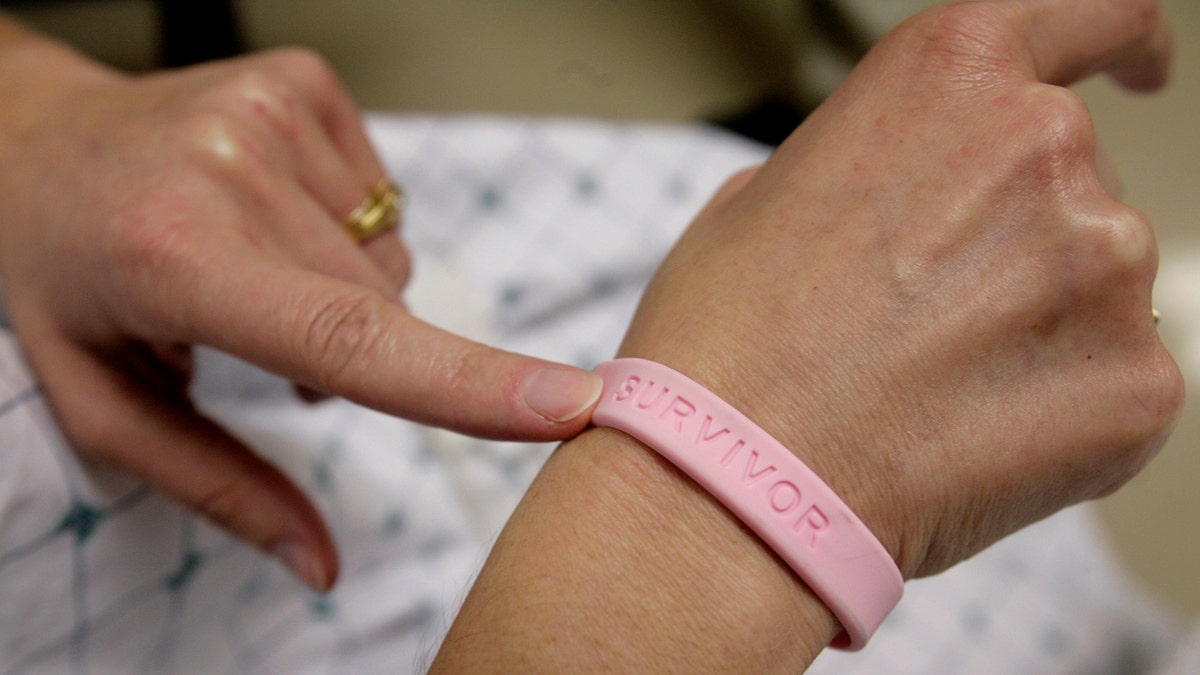
A cancer patient shows off her breast cancer survivor bracelet. (REUTERS/Jim Bourg)
After treatment for cancer, survivors often complain about a loss of personal control, a new study found.
The study’s lead author said that while the responses can’t be generalized to all cancer survivors, people in the study often mentioned a physical problem or a wish to return to “normal.”
“Cancer survivors are often caught off guard about the lingering problems once treatment is complete,” said Mary Ann Burg, a medical sociologist and clinical social worker at the University of Central Florida in Orlando.
She and her colleagues write in the journal Cancer that in earlier studies, between a fifth and a third of cancer survivors ended up with physical or mental health concerns at least five years after treatment.
Those results tend to be limited to a list of ailments presented by researchers for the participants to pick from. For this study, the researchers used data from a 2010 American Cancer Society survey that asked more than 9,000 participants an open-ended question about their health after cancer treatments.
“It seemed to me that there was a lot of data that had been not been tapped out of this American Cancer Society survey,” Burg said. “It’s very difficult to do an analysis of open-ended questions especially when there are thousands of responses.”
For the new report, the researchers analyzed the 1,514 responses to the open-ended question.
The respondents ranged in age from 24 to 97. About 65 percent were female, about 45 percent were breast cancer survivors, and about 21 percent were prostate cancer survivors.
About 38 percent - more than a third - reported some sort of physical problem after their cancer treatments. Those included anything from pain to problems with sexual health.
About a fifth of participants reported financial or insurance problems. About a fifth also complained about education and information following their cancer treatments. Some of those individuals had unanswered questions about their care, such as what to expect and what to do after treatment.
About 16 percent mentioned items related to personal control, which includes any problems that stand in a person’s way of being physically and socially independent. Those items include a broad range of issues, including a person having poor bladder or bowel control following treatment. Also, it can include a person having trouble making plans or socializing.
Men were more likely than women to mention unmet needs that fell under physical and personal control. Prostate cancer survivors and older participants were also more likely to report those unmet needs, too.
Women were more likely than men to report unmet needs in other areas, however.
Burg said the next step is to see whether preparing patients for the lingering effects of cancer and its treatment may help people feel less burdened by these unmet needs.
“They may have been told to some degrees what the side effects are, but ultimately they find there is more of an impact than they realized,” Burg said.
“If people feel better prepared even if they have negative consequences, do they cope with it better than if it were an unpleasant surprise?” she said.
For people who may be currently undergoing cancer treatment, Burg's advice is to ask their doctors questions.
“I think one of the things we have to do is get patients empowered and really suggest to patients that they need to continue asking questions and present questions when they occur to your providers,” she said.








































